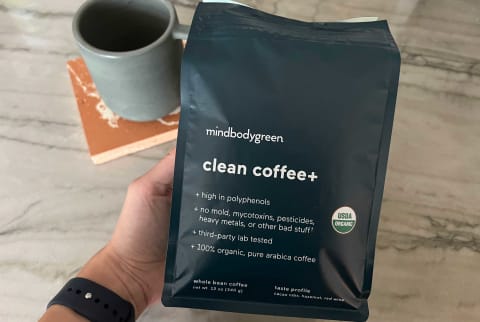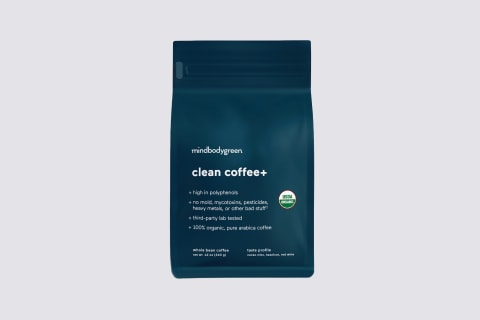Advertisement
My Review Of clean coffee+: The Top Sustainability & Health Perks


As someone who is not at all a morning person, the promise of coffee is usually what gets me out of bed. I've been drinking one to two cups most days for years, and I still look forward to the first sip every single time. While I enjoy the occasional coffee shop, I drink most of my java at home.
As for beans, I used to choose mine purely on flavor—but I recently learned that there are a few other important factors that impact the health and sustainability of my beloved morning ritual. Here's the tea on coffee, and how it's changed the way I shop for it.
Why the future of coffee is up in the air
Coffee, like so many crops, is threatened by climate change. As I learned during a recent United Nations panel put together by Illy coffee, greenhouse gas emissions could reduce the amount of land suitable for coffee production by 50% by 2050.
Increasing drought, biodiversity loss, and decreasing soil quality1 all threaten fragile coffee crops—particularly arabica coffee beans2—research finds. This issue is compounded by the fact that those who work on coffee farms (70% of whom are women) rely on a healthy crop for their livelihoods.
Moving toward a regenerative way of growing3 that prioritizes soil health, reduces chemical fertilizers and pesticide use, and conserves water can help strengthen the coffee industry and those who depend on it.
That's why when mindbodygreen developed our first coffee product, clean coffee+, we set out to work with farmers who are actively working with nature, not against it. Our arabica bean blend comes from farms across Africa, Indonesia, and Central & South America.
What brings these global farms together is a commitment to shade-growing coffee in mountainous regions. Instead of taking the approach of clearing existing forests to make way for coffee plants, our producers work within existing ecosystems to grow plants in a way that reinvigorates soil health.
The multigenerational farmers who grow our organic, fairly traded coffee beans are also paid fair prices so they can be successful in the long term. This investment leads to a slightly more expensive product, but I can feel good knowing that I'm supporting the coffee future that I'd like to see.
This commitment to sustainability leads to a healthier product too
Regenerative growing practices don't just reinvigorate land; they lead to a healthier product too. Since our beans grow in nutrient-dense soil, they are high in an impressive array of native polyphenols—which support antioxidant activity and combat oxidative stress4. Our clean coffee+ beans are also grown and handled in a way that minimizes their potential for mold and mycotoxins, which are frighteningly common on the crop.
I'm already actively trying to reduce my exposure to mold in my home—why not do the same for my groceries, particularly those I'm consuming every single day?
In addition to mycotoxins, clean coffee+ has been tested for nasties like heavy metals, pesticides, solvents, and acrylamide—giving me further peace of mind that my morning brew is helping my health routine, not harming it.†
Last but not least, the flavor is also top-notch. It makes for a smooth, rich, slightly sweet cup that contains just the right amount of caffeine to make me feel energized without any jitters or lingering anxiety. So far, I've tried it as iced and hot drip coffee, and both have been delicious.
The takeaway
I'm a longtime coffee lover who put admittedly little thought into the environmental and health impacts of my caffeine routine—until now. After trying mindbodygreen's clean coffee+, I'm inspired to continue choosing a sip that aligns with my environmental values. Making this choice for the planet will also pay off for my health—and who doesn't love a win-win?

Why Nutrition Is Key To Changing Your Relationship With Alcohol
Brooke Scheller, DCN, CNS

Why Alcohol Sabotages Your Gut Health & How To Get Back On Track
Brooke Scheller, DCN, CNS

Why Nutrition Is Key To Changing Your Relationship With Alcohol
Brooke Scheller, DCN, CNS

Why Alcohol Sabotages Your Gut Health & How To Get Back On Track
Brooke Scheller, DCN, CNS

Why Nutrition Is Key To Changing Your Relationship With Alcohol
Brooke Scheller, DCN, CNS

Why Alcohol Sabotages Your Gut Health & How To Get Back On Track
Brooke Scheller, DCN, CNS

Why Nutrition Is Key To Changing Your Relationship With Alcohol
Brooke Scheller, DCN, CNS

Why Alcohol Sabotages Your Gut Health & How To Get Back On Track
Brooke Scheller, DCN, CNS















